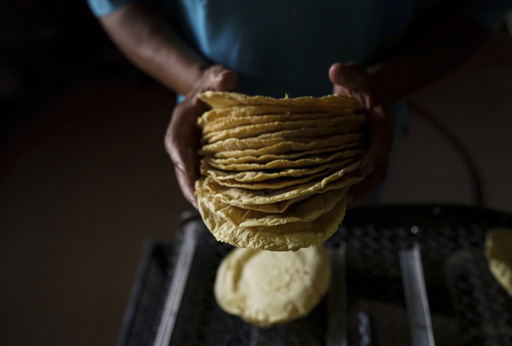
MEXICO CITY — The new president of Mexico, Claudia Sheinbaum, introduced a fresh agricultural strategy on Tuesday that seeks to reshape the nation’s food production and distribution system reminiscent of the 1980s. This era was characterized by meals composed primarily of staples like tortillas, beans, instant coffee, and economical hot chocolate, with many ingredients sourced from government stores featuring a limited selection.
Sheinbaum vowed to revitalize these often underwhelming government outlets and reiterated her commitment to achieving “food sovereignty.” She articulated her vision, emphasizing, “It’s about producing what we eat,” with a particular emphasis on enhancing the domestic production of beans and corn.
Demonstrating a clear preference for beans, Sheinbaum remarked, “It is much better to eat a bean taco than a bag of potato chips,” during her address on Monday. Agriculture Secretary Julio Berdegué elaborated on the strategy, indicating a plan to guarantee prices for farmers who cultivate corn for tortillas and to reduce tortilla prices by ten percent following a significant spike in costs over the last couple of years.
The administration aims to increase bean production by approximately 30% within a six-year timeframe to lower reliance on imports, establishing research centers to provide high-yield bean seeds. Berdegué noted that achieving self-sufficiency in beans is a primary directive from Sheinbaum.
In addition to beans and corn, the initiative will also involve bolstering coffee production—primarily catering to the instant coffee market, which is reportedly a staple in 84% of Mexican homes. Furthermore, there will be measures to enhance cocoa production, although the focus will remain on powdered baking products and hot chocolate instead of premium chocolate bars.
These policies seem to contradict current market dynamics and the existing food consumption patterns in Mexico. Today, many Mexicans opt for modern grocery shopping, and there has been a notable rise in the demand for fresh ground coffee, notably with the growth of specialized coffee shops. In contrast, bean consumption has experienced a significant decline over the past decades. Current statistics show that Mexicans consume merely around 17 pounds (about 7.7 kilograms) of beans per year, a stark drop from the 35.2 pounds (16 kilograms) consumed in 1980, according to the government’s “2024 Agricultural Panorama” report.
Several factors contribute to this decline, including the lengthy cooking times required for dried beans. Amanda Gálvez, a researcher from Mexico’s National Autonomous University, commented on the stigma associated with beans, noting, “we look down at beans because it is considered ‘the food of the poor,’ and we are making a serious mistake,” as beans are a valuable source of protein. Nonetheless, their health benefits may be diminished due to common preparation methods, such as refried beans, which are often cooked with lard.
Additionally, tortilla consumption has also seen a decrease, dropping from nearly 220 pounds (100 kilograms) per capita annually in 2000 to around 165 pounds (75 kilograms) by 2024, as consumers increasingly turn to alternative bakery products.
Alongside the challenge of altering consumer preferences, these policies also appear to diverge from market trends. While some countries focus on cultivating high-value chocolate varieties, Mexico is concentrating on its most economical offerings. Despite its historical significance as the origin of chocolate, the domestic production in Mexico has experienced a downturn due to plant diseases and insufficient investment, plummeting from nearly 50,000 tons in 2003 to about 28,000 tons in 2022.
Moreover, while it’s common for Mexican households to have instant coffee stocked, the trend in consumer spending indicates a shift away from instant products, which comprised only about 37% of the sales value within the coffee market, as per a Technavio industry report.
Sheinbaum’s emphasis on achieving self-sufficiency across oil, energy, and food sectors reflects the legacy of her predecessor, former President Andrés Manuel López Obrador, who stepped down from office on September 30. López Obrador’s governance was also marked by a sense of nostalgia for a 1970s-style Mexico encompassing state-owned industries, passenger rail services, tightly-knit families, and small neighborhood stores, which appears to have influenced Sheinbaum’s vision.
